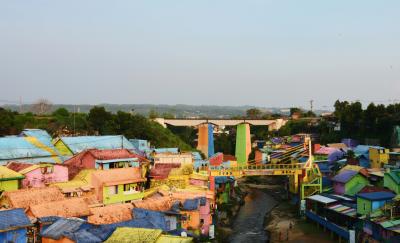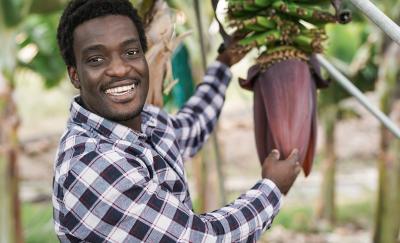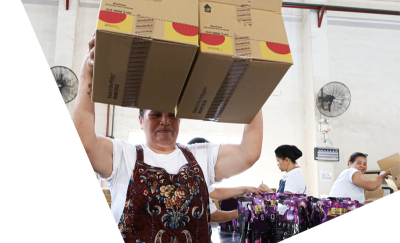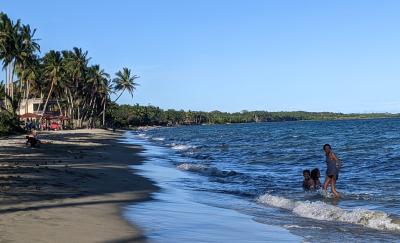The impacts of climate change in Morocco are severe, with temperature extremes, catastrophic floods, aggressive storms, and decreasing and more variable rainfall leading to the depletion of natural resources, particularly freshwater reserves. Women, young people, the poor, people living with disabilities, nomadic populations, and other minoritized groups are more vulnerable to climate shocks based on a variety of factors, including socially constructed roles and responsibilities, limited access to and control over resources, muted voices in decision-making, and restricted rights.
At the same time, these populations often possess unique knowledge and experiences that make them well-positioned to play vital roles in climate governance, policy, and action. As Morocco translates plans and roadmaps into climate action, engaging these groups as change agents will be key. This panel will discuss the different issues these populations face, leading practices in incorporating an inclusive lens in advancing climate action, and how different stakeholders can adopt these practices in the Morocco context.
Moderator: Caroline Staub, Senior Climate Adaptation and Resilience Specialist, Abt Global
Caroline Staub, Ph.D., is a Sr. Technical Lead on Climate Adaptation at Abt Global, focusing on strategy, business development and thought leadership. A physical geographer by training, Caroline brings 15-plus years' experience in climate change adaptation and resilience, environmental science, natural resources management, resilient agriculture, and food security. Before joining Abt, she was a researcher at the University of Florida’s Institute of Food & Agricultural Sciences on a USDA-funded agricultural extension project in the Southeast U.S. and a USAID-funded food security project in Haiti, developing and implementing climate-informed decision support tools and approaches for use in the agricultural sector. She also consulted for the World Bank Group on climate-smart agriculture investments and supported the development of a blueprint for digital climate-informed advisory services for the Global Center on Adaptation.
Panelists:
Allison Salyer
Senior Gender Advisor, USAID/Middle East Bureau
Allison Salyer currently serves as USAID’s Acting Director for Democracy, Governance, Peace and Security and has served as a Senior Advisor for Gender and Human Rights for USAID's Bureau for the Middle East since 2014. Within that portfolio she focuses on the thematic issues of gender equality and women's empowerment, human rights, gender-based violence prevention and response, women, peace and security and broader social inclusion. At the regional level she focuses on support to USAID Missions in policy and strategy development, analysis, design, training and procurement. She works regularly with USAID Missions in the region to both support their needs and provide insight and updates on gender policy development and guidance.
Ellen Bomasang
Principal, Energy, Climate, and Gender, Abt Global
Ellen Bomasang is an international development professional whose focus has been clean energy, climate, and inclusive growth across emerging economies in Asia, Africa, Eastern Europe, Latin America, and the Middle East for nearly 30 years. She started her career in renewable energy, concentrating on policy, finance, and rural access issues. Her project work spans innovative finance, planning, policy and regulatory reform, private sector engagement, rural electrification, and gender equality and social inclusion (GESI). In the GESI space, she has led the design and delivery of interventions to close gender gaps in employment and skills, entrepreneurship, access to finance, and livelihoods, enhancing women's and other historically excluded populations' skills and increasing their participation in decision-making. She is supporting the USAID Comprehensive Action for Climate Change Initiative and USAID Mongolia Energy Governance Activity as Senior GESI Adviser.
Fatna Ikrami Elfanne
Director of Projects, Youth for Climate Morocco
Fatna Ikrame El Fanne is an environmental engineer dedicated to tackling climate change. She holds master’s degrees in water and environmental management from Mohammed V University in Morocco and Environmental Engineering from Suzhou University of Science and Technology in China and is currently pursuing a PhD at Harbin Institute of Technology in China. Fatna co-founded "Youth for Climate Morocco," an NGO focused on raising awareness, empowering youth, and promoting sustainable solutions. With extensive experience as an advisor, project manager, and coordinator, she has been instrumental in various environmental initiatives. Fatna’s leadership and advocacy have led to speaking engagements at numerous conferences and events. She is a firm believer in the power of collaboration and is committed to bridging the gap between academia, industry, and policymaking to create impactful and lasting change. Her work continues to inspire and mobilize young people across Morocco and beyond to take meaningful action for a sustainable future.
Naima Oumoussa
Climate Adaptation Specialist, Directorate of Climate and Biodiversity, Department of Sustainable Development, Ministry of Energy Transition and Sustainable Development
Naima Oumoussa joined the Environment Department at the Ministry of Energy Transition and Sustainable Development in 2001. Since May 2011, she has held the position of Head of Adaptation issues within the Directorate of Climate Change and Biodiversity. Her responsibilities included coordinating the formulation process of Morocco’s National Adaptation Plan and following negotiations on adaptation and loss and damage issues for the Moroccan team. From 2007 to 2011, she worked as an assistant in the environment program of the Peace Corps in Morocco, where she was responsible for the annual technical training of approximately 50 Peace Corps volunteers, supervising their fieldwork and initiating community adaptation projects in three different vulnerable ecosystems (oasis, mountain, and forest).
Jennifer Denno Cissé
Senior Director, Climate Adaptation and Resilience, Abt Global
Jennifer Cissé, Ph.D., leads Abt Global’s Climate Adaptation and Resilience practice, driving strategy, business development, project execution, and thought leadership for public and private sector clients globally. With over 15 years of expertise in risk and resilience, she serves as the climate adaptation technical lead for diverse client needs. Before joining Abt, Jenn was a senior research manager at the UN University Institute for Environment and Human Security where she supported the Munich Climate Insurance Initiative, overseeing research collaborations, leading global disaster risk finance evidence initiatives, and developing best practices in climate and disaster risk finance. Earlier, Jenn was a senior risk advisor at the U.S. Agency for International Development (USAID). There she was a key technical authority on risk and food security, handling risk mitigation, agricultural insurance, and disaster risk finance and managing a $35 million risk and insurance portfolio.







